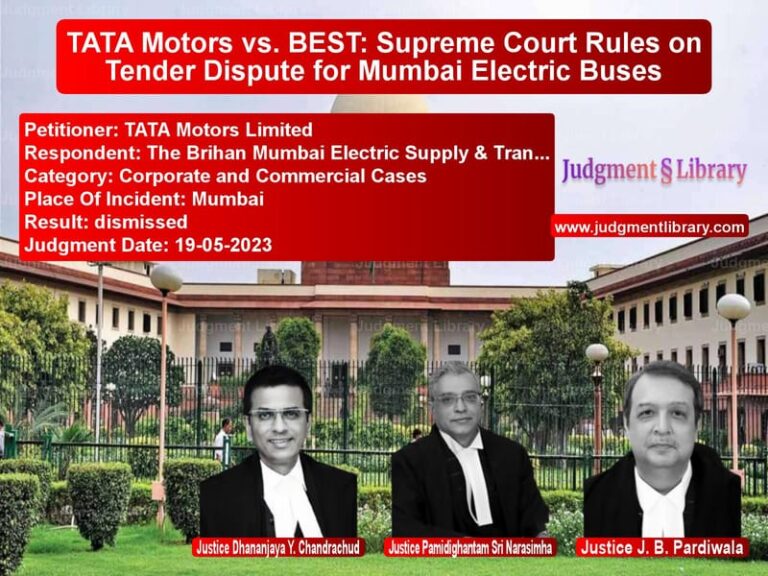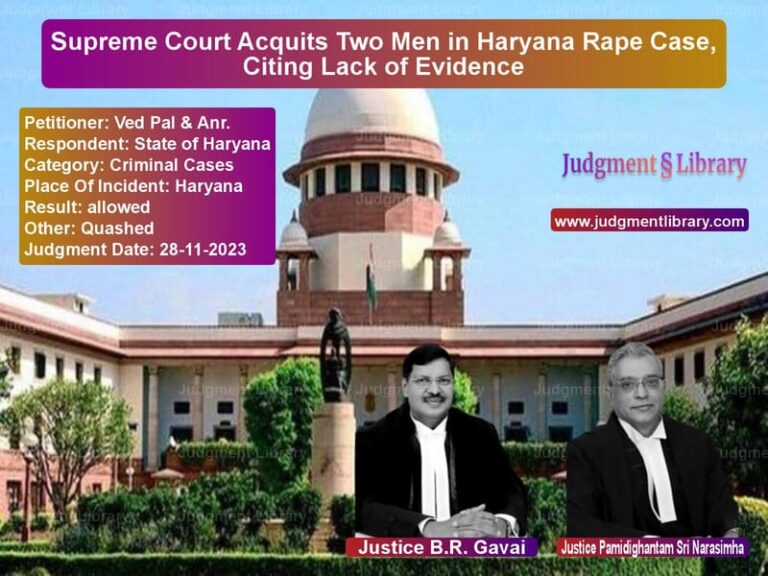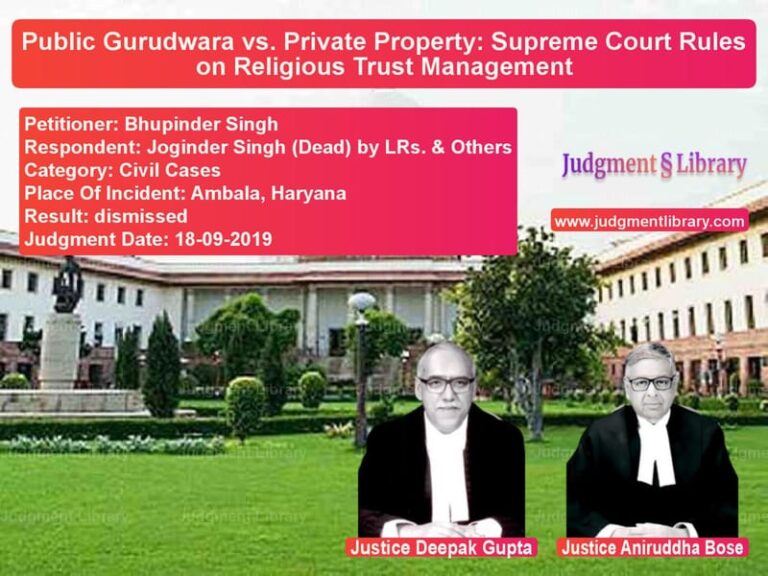Supreme Court Quashes Conviction in Fake Caste Certificate Case
The case of Vimalakka Ramappa Koli @ Talwar vs. The State of Karnataka revolves around the allegation of obtaining a caste certificate under false pretenses. The Supreme Court was called upon to determine whether the conviction of the appellant under Sections 198 and 420 of the Indian Penal Code (IPC) was justified in the absence of specific findings proving fraudulent intent. The Court ultimately quashed the conviction, ruling that the ingredients of the alleged offenses were not sufficiently established.
Background of the Case
The prosecution’s case was based on the following sequence of events:
- On September 9, 2022, the appellant applied for a Scheduled Caste (SC) certificate, claiming that she belonged to the Hindu Holer Caste, which is a recognized SC category in Karnataka.
- Based on her application, a caste certificate was issued, which enabled her to apply for a loan from the Karnataka Scheduled Caste and Scheduled Tribe Development Corporation Limited, Belgaum.
- Upon further scrutiny by the District Caste Verification Committee, it was determined that the appellant actually belonged to the Hindu Talwar Caste, which is not a Scheduled Caste.
- The Committee invalidated her caste certificate.
- A First Information Report (FIR) was registered, and a charge sheet was subsequently filed against the appellant under Sections 196, 198, and 420 IPC.
Trial Court Decision
The Judicial Magistrate initially acquitted the appellant, holding that the prosecution had failed to establish fraudulent intent beyond a reasonable doubt.
Sessions Court Decision
The State of Karnataka filed an appeal against the acquittal. The Sessions Court:
- Reversed the acquittal and convicted the appellant under Sections 196, 198, and 420 IPC.
- Sentenced the appellant to three years of simple imprisonment and a fine of Rs. 5,000, with an additional three months of simple imprisonment in case of default.
High Court Decision
The appellant challenged the Sessions Court’s ruling before the Karnataka High Court, which:
- Upheld the conviction under Sections 198 and 420 IPC.
- Acquitted the appellant under Section 196 IPC.
- Reduced the substantive sentence to six months of imprisonment.
Key Legal Issues Considered
- Whether the Sessions Court had properly examined the essential ingredients of the offenses under Sections 198 and 420 IPC.
- Whether obtaining a caste certificate, later invalidated, constituted an offense under the IPC.
- Whether there was mens rea (criminal intent) necessary to establish guilt under Sections 198 and 420 IPC.
Petitioner’s Arguments
The appellant’s counsel argued:
- The Sessions Court had failed to record findings that the elements of fraud were satisfied.
- The appellant had not knowingly misrepresented her caste; she merely failed to prove her claim upon verification.
- The Sessions Court was swayed by the fact that many caste certificates were being invalidated, rather than considering the specific facts of the case.
- The mere fact that the caste certificate was later invalidated did not automatically make it false or fraudulent.
Respondent’s Arguments
The State of Karnataka contended:
- The appellant had knowingly falsified her caste status to obtain financial benefits.
- By using the caste certificate, the appellant had corruptly used a false document, as defined under Section 198 IPC.
- The prosecution had sufficiently proven that the appellant had obtained the caste certificate fraudulently.
Supreme Court’s Observations
1. Overturning an Acquittal Requires Strong Justification
The Court reaffirmed that an appellate court should not overturn an acquittal unless:
“The only plausible finding which could have been recorded based on the evidence on record is that the accused is guilty.”
Since the Sessions Court had not recorded such a finding, the Supreme Court ruled that the conviction was flawed.
2. No Proof of Corrupt Intent Under Section 198 IPC
The Court examined Section 198 IPC, which states:
“Whoever corruptly uses or attempts to use any such certificate as a true certificate, knowing the same to be false, shall be punished in the same manner as if he gave false evidence.”
The Court noted that:
- The term “corruptly” implies a deliberate intention to deceive, which was not proven.
- There was no evidence that the appellant knew her claim was false when she applied.
- Invalidation of a caste certificate due to insufficient proof does not automatically imply it was knowingly false.
3. No Evidence of Fraud Under Section 420 IPC
The Court held that fraud requires:
- Dishonest or fraudulent intent at the time of making the claim.
- Misrepresentation that causes willing deception by another party.
Since there was no evidence of the appellant knowingly deceiving authorities, her conviction under Section 420 IPC was also unsustainable.
Final Judgment
The Supreme Court ruled:
- Allowed the appeal, quashing the conviction.
- Reinstated the acquittal granted by the Trial Court.
- Held that an individual who applies for a caste certificate and fails verification cannot be automatically treated as a criminal.
Conclusion
The Supreme Court’s ruling in Vimalakka Ramappa Koli @ Talwar vs. The State of Karnataka establishes an important precedent in cases involving disputed caste certificates. The judgment reinforces that:
- Mere invalidation of a caste certificate does not amount to a criminal offense.
- Mens rea (criminal intent) must be proven for convictions under Sections 198 and 420 IPC.
- The judiciary must carefully distinguish between genuine errors and deliberate fraud.
This case is a significant ruling in protecting individuals from unwarranted criminal liability in caste certificate disputes.
Petitioner Name: Vimalakka Ramappa Koli @ Talwar.Respondent Name: The State of Karnataka.Judgment By: Justice Abhay S. Oka, Justice Augustine George Masih.Place Of Incident: Belgaum, Karnataka.Judgment Date: 16-10-2024.
Don’t miss out on the full details! Download the complete judgment in PDF format below and gain valuable insights instantly!
Download Judgment: vimalakka-ramappa-ko-vs-the-state-of-karnata-supreme-court-of-india-judgment-dated-16-10-2024.pdf
Directly Download Judgment: Directly download this Judgment
See all petitions in Fraud and Forgery
See all petitions in Bail and Anticipatory Bail
See all petitions in SC/ST Act Case
See all petitions in Judgment by Abhay S. Oka
See all petitions in Judgment by Augustine George Masih
See all petitions in allowed
See all petitions in Quashed
See all petitions in supreme court of India judgments October 2024
See all petitions in 2024 judgments
See all posts in Criminal Cases Category
See all allowed petitions in Criminal Cases Category
See all Dismissed petitions in Criminal Cases Category
See all partially allowed petitions in Criminal Cases Category







